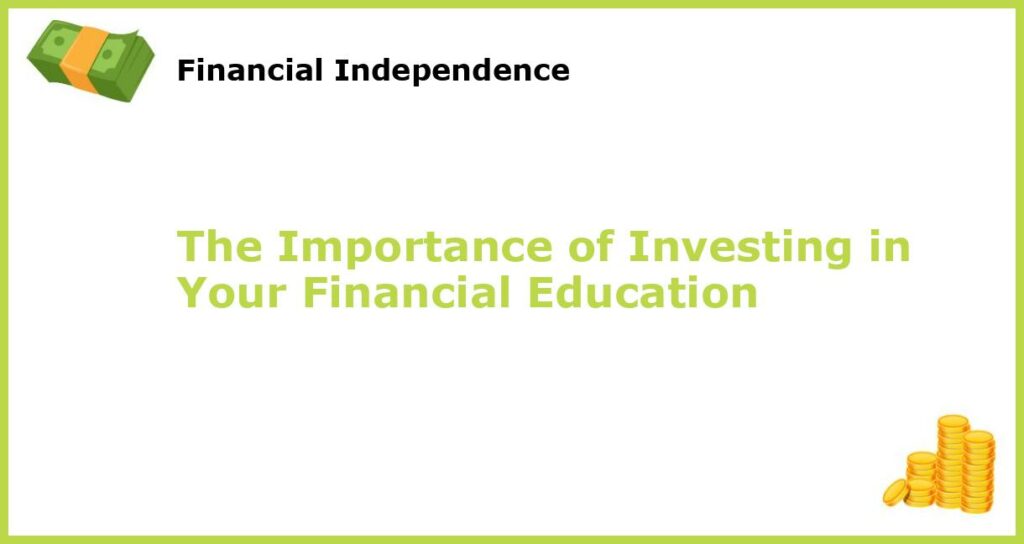Let’s face it, money matters. A lack of financial literacy can lead to making poor financial decisions that have long term consequences. This is why investing in your financial education is so important. Your financial education matters more than you might think.
Why Your Financial Education Matters

Many people go through life without ever thinking about their financial education. They assume that as long as they have a job and can pay their bills, everything will be fine. However, the truth is that financial education is an essential part of living a fulfilled life. When you invest in your financial education, you gain knowledge about how to save, budget, invest, and grow your wealth. This knowledge can help you avoid costly mistakes and ensure that you achieve your financial goals.
Investing in one’s financial education is basic but crucial. You cannot build a solid drywall without a sturdy brick wall. Investing in one’s financial education helps build that sturdy foundation. Proper financial knowledge can make sure that the choices you make towards your finances can bring you closer to your goals rather than further away.
Having knowledge of your finances will also make you understand the conditions of your finances to avoid any financial missteps. The fact is that financial education isn’t taught in school. Therefore, you should take the initiative to learn on your own to avoid future problems.
Better Financial Management

When you invest in your financial education, you will become better equipped to manage your finances. You will be able to create a personal budget and track your expenses, which will help you to live within your means. Additionally, you will become knowledgeable about different investment options, such as stocks, bonds, mutual funds, and real estate. With this knowledge, you can make informed investment decisions that can help grow your wealth over time.
A financial education means having access to diverse opportunities and choices. Like investing in stocks and real estate, anything that can potentially increase your wealth. Having a personal budget helps you navigate the crucial question of “how much can I save?” Having an understanding of budgeting can make sure you don’t overspend and use credit cards extensively.
Better financial management also means you’ll have an accurate understanding of where you can put your money for growth, and what investments might not be worthy of our money. Learning this prevents regret and expensive mistakes in the long run.
Increased Financial Confidence

Many people feel overwhelmed by their finances and have no idea where to start. When you invest in your financial education, you will increase your financial confidence. You will learn how to make a plan and stick to it, which will help you to achieve your financial goals. This newfound confidence can also help you negotiate better deals or ask for a raise at work, knowing that you have a solid financial foundation.
One important aspect of financial knowledge is learning how to manage one’s emotions towards money. Investing in one’s financial education helps people manage and overcome anxiety and financial stress. This confidence and clarity towards financial planning can make you comfortable conversing on financial matters, making you more confident in financial negotiations or dealing with finance professionals.
At times, having more confidence and knowledge with your financials can lead you to make more informed choices and avoid making potentially catastrophic financial decisions. The main aim of financial education is personal empowerment, so you don’t have to depend on others to handle your finances. This facilitates informed decision-making, making you more self-reliant financially.
Understanding Financial Risks

Investing always involves some degree of risk. When you invest in your financial education, you will learn about the different types of risks, how to mitigate them, and how to identify opportunities. You will learn how to evaluate investment options and determine which ones are worth your time and money. Understanding financial risks can also help you avoid scams and fraudulent investment schemes.
Investing without any knowledge can make you lose a considerable chunk of your hard-earned money. Therefore, it’s always important to understand the risks you’ll be undertaking. Investing without any knowledge is pure gambling. Understanding risk is the cornerstone of making informed decisions about investing. A financial education can make sure you understand which factors can affect your investment, helping you avoid making impulsive decisions.
Additionally, a financial education most often includes identifying and avoiding scams. Scammers are always on the lookout for unsuspecting investors, especially those with a lack of financial knowledge. Once you understand how to distinguish between investment opportunities that seem shady, you safeguard yourself not just from financial loss but also from potential fraud.
Less Stress and Anxiety

Money is often cited as one of the top sources of stress and anxiety for people. When you invest in your financial education, you will become better equipped to cope with financial stress. You will have a better understanding of your financial situation and will have a plan in place to achieve your goals. This sense of control over your finances can help reduce stress and lead to a more balanced life.
Money is stressful, and financial anxiety is prevalent among most adults. Worrying about money can affect mental and emotional health, making you anxious about the future. Understanding finances makes sure you have financial security, which leads to peace of mind. Having a better handle on finances implies you can ride out difficult periods without stress and anxiety.
The fact that a financial education can lead to a stress-free life should encourage more people to start the journey of educating themselves on their finances.
Financial Stability and Freedom

Investing in your financial education can help you achieve financial stability and freedom. You will learn how to save, invest, and grow your wealth, which can lead to financial stability. You will also be able to create a plan to achieve your financial goals, such as paying off debt, buying a home, or retiring comfortably. With financial freedom, you will have the resources to do what you want in life, rather than being limited by your financial circumstances.
Financial stability is not only about having enough money to get by, but it’s also about having enough cushioning to ride through some tough moments. Having financial freedom means not worrying about bills, repayments or losing a job before slightly going bankrupt.
A financial education can put all these into place, making sure you have a sustainable plan that also considers potential setbacks. When you learn to create a better financial plan, you can aim to achieve the goals that matter to you rather than surviving paycheck to paycheck. Financial freedom means having your priorities set up and being able to accomplish what you strive for, be it travel, starting a business, or pursuing a passion.
The Ability to Help Others

When you invest in your financial education and achieve financial stability, you will also have the ability to help others. You can donate to charities or support causes that you care about. Additionally, you can provide financial support to family members or friends who need it. With financial freedom, you can make a positive difference in the lives of others.
As an individual, you will likely feel the need to uplift those around you. Knowledge in finances often opens doors for you to make fundamental contributions to people in the community as well as those closest to you. Financial assistance to those closest to you can mean being a helping hand during times of need. It could also mean philanthropy, where you can donate money to your favorite charities, non-profits, or other worthy causes that align with your priorities. Giving back to the community makes an enormous difference, and financial freedom will provide you with that privilege.
A Competitive Advantage

Investing in your financial education can give you a competitive advantage in life. Employers look for candidates who are knowledgeable about personal finance and have good financial management skills. Additionally, those who are financially savvy are often more successful in their personal lives as well. With a solid financial education, you will be able to navigate various financial situations with confidence, which can lead to greater success in all areas of life.
You’ll never know where or how financial knowledge could come in handy. The ability to have a stable financial plan, know when and where to invest, or how to create a saving plan, could be the key to success. Those who manage to have a better grasp of finances, regardless of the field, are often seen by employers as better candidates.
The knowledge gained would also work in everyday life, making you an expert in creating a budget for a vacation plan, owning a mortgage, or even family planning. Making smart financial decisions helps one achieve optimal life goals, so a financial education isn’t only for the sake of the future but the present as well.
A Lifetime of Benefits

Investing in your financial education is not a one-time event. It is a process that requires ongoing learning and growth. However, the benefits of investing in your financial education will last a lifetime. You will have the knowledge and skills to manage your finances, achieve your goals, and create a better life for yourself and those around you.
The fact that personal finance is continually changing means having a continuous learning curve. A financial education is a life-long journey that will never disappoint you. With the world constantly evolving, there is always something new to learn about finance, be it new technology or regulatory changes. Everyone can take advantage of continuing education, having financial knowledge that aligns with their needs and situations.
Start Investing in Your Financial Education Today

Don’t underestimate the importance of investing in your financial education. Whether you are just starting out in your career or are well-established, there is always something new to learn about personal finance. Start by reading books on personal finance, attending seminars or webinars, or working with a financial advisor. By investing in your financial education, you will not only improve your financial situation but also create a better life for yourself and those around you.
The journey towards a well-rounded financial plan is present and crucial for everyone. Starting the journey as early as possible means one could avoid costly mistakes and start the journey to financial freedom. Everyone can use financial stability and investing in a financial education remains the best way to guarantee that.







